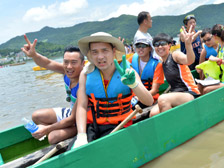
Victory seekers:
Volunteers from the disciplinary forces and intellectually impaired people comprise a special team with their sights set on a trophy in a Sai Kung dragon boat regatta.
Victory seekers:
Volunteers from the disciplinary forces and intellectually impaired people comprise a special team with their sights set on a trophy in a Sai Kung dragon boat regatta.
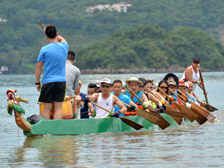
Paddle power:
A special dragon boat team comprised of 20 paddlers, half with intellectual disabilities, train hard to finish first in the 400-metre race.
Paddle power:
A special dragon boat team comprised of 20 paddlers, half with intellectual disabilities, train hard to finish first in the 400-metre race.
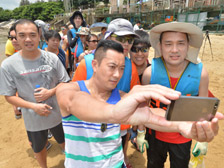
Say cheese:
Police volunteer Harbour Chan (front left) and Freeman Chung (front right) who is autistic, are two founding members who have been on the team since it was established in 2007.
Say cheese:
Police volunteer Harbour Chan (front left) and Freeman Chung (front right) who is autistic, are two founding members who have been on the team since it was established in 2007.
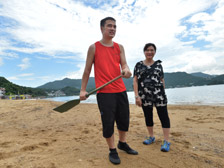
Paddle master:
Freeman Chung’s mother was thrilled to see her son mature into a ‘big brother’ on the team.
Paddle master:
Freeman Chung’s mother was thrilled to see her son mature into a ‘big brother’ on the team.
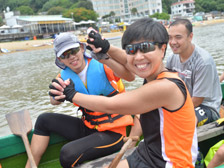
Hand-in-hand:
Monita Tam (right) appreciates her special teammates’ great concentration and all-out effort.
Hand-in-hand:
Monita Tam (right) appreciates her special teammates’ great concentration and all-out effort.
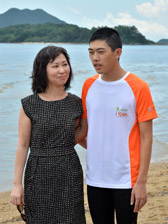
Eager athlete:
Jesper Fung, 20, is autistic, but keen to participate in different sports.
Eager athlete:
Jesper Fung, 20, is autistic, but keen to participate in different sports.
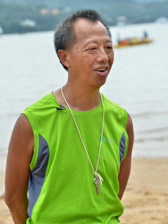
Pulling together:
Team training co-ordinator Luk Yat-hei admits he had doubts about the team’s sustainability when it was first established, but the team has proven willpower can triumph over technical weaknesses.
Pulling together:
Team training co-ordinator Luk Yat-hei admits he had doubts about the team’s sustainability when it was first established, but the team has proven willpower can triumph over technical weaknesses.
Team spirit fuels paddle power
June 01, 2014
When Police volunteers signed on to mentor intellectually challenged members of a special dragon boat team, they expected to do all the teaching. But being in the same boat paddling furiously towards the same goal taught them all some enduring life lessons.
The Neighbourhood Advice-Action Council, a non-governmental organisation that promotes the values of self-help, integration and mutual support in the neighbourhood, established this special dragon boat team and an annual dragon boat race in 2007.
Freeman Chung, now 26, was a founding member who succeeded in fulfilling the basic requirement: the ability to swim freestyle for 50 metres. He has competed in the race every year since.
“One paddle up, one paddle down. It’s hard, but we have to continue,” he said. Being autistic and mildly mentally disabled, Freeman is not good at communicating with others. To develop his social skills, his mother always encouraged him to join activities that would require interaction with others.
Mrs Chung recalled Freeman’s early days on the team.
“He was very passive, and could not even follow the warm-up exercises, nor grip the paddle properly. But he kept improving and is now a ‘big brother’ on the team, thanks to the coaches’ and disciplined services volunteers’ careful guidance and patience,” she said.
Police volunteer Harbour Chan is another founding team member. When a friend invited him to join, the strong swimmer with lifesaving skills expected to serve the intellectually impaired team members.
“At first, I didn’t know how to communicate with the disabled, but as time went on, our friendship grew as we paddled together side by side,” he said.
Over seven years, he found that he has learned a great deal from his special teammates.
“There are many choices in our life. But for them, choices are limited. When I sit alongside them in the boat, they never give up and never complain. Instead, they are more positive and work harder than we do,” Mr Chan said.
“Dragon boating is team work, life is team work. Our paddling speed is sometimes fast, sometimes slow. But we are all going in the same direction, towards the same goal. We can succeed if we work as a team, and if we treasure and enjoy the process.”
One team, one goal
Mr Chan persuaded his colleague Monita Tam to join the special dragon boat team as a Police volunteer in 2010.
“It is not just us who are accommodating towards them, they are also accommodating towards us,” she said.
As the Dragon Boat festival approaches, the team has regular Sunday practice sessions. Ms Tam appreciates her special teammates’ great concentration and all-out effort which they demonstrated in full on the day they had capsize training – learning what to do when a boat overturns.
“It was raining and the water was really cold, but they did not complain. When the training ended, they asked why we had to stop so soon. They wanted to practice more, to improve their performance,” she said.
Ms Tam’s partner, 20-year old Jesper Fung, also joined the team four years ago. Like Freeman, he is autistic, but is keen to participate in different sports.
“Dragon boating is fun. From the Police volunteers, I learned about co-operation and team spirit. I want our team to win, but even if we lose, I won’t be upset. We have done our best,” Jesper said.
Enduring willpower
Team training co-ordinator Luk Yat-hei admits he had doubts about the team’s sustainability when it was first established. To train up a group of disabled people to co-operate with a group of disciplinary services volunteers is a challenge for a coach, also. But after seven years, the team has proven willpower can triumph over technical weaknesses.
“The team has matured and has self-determination, with members pulling together to get the best possible result in the race,” Mr Luk says.
The Neighbourhood Advice-Action Council organises the special dragon boat regatta in Sai Kung each year on the morning of the Dragon Boat Festival. Three NAAC teams will compete in the two local races, with five boats in each race.
Two of those NAAC teams will also compete in an invitational tournament that afternoon against special dragon boat teams from Hong Kong, the Mainland, Macau and Taiwan.
Two NAAC teams will go on to compete in the upcoming Hong Kong International Dragon Boat Races 2014 in Victoria Harbour off east Tsim Sha Tsui from June 8 to 10.